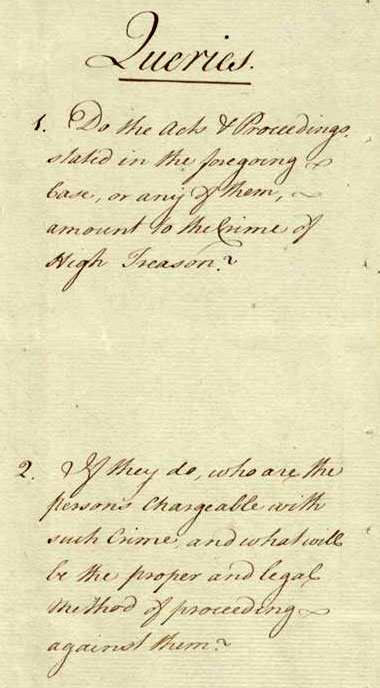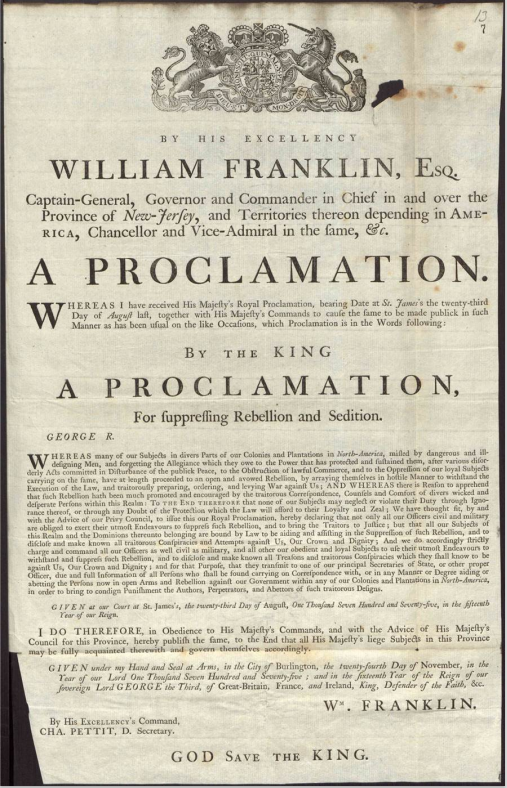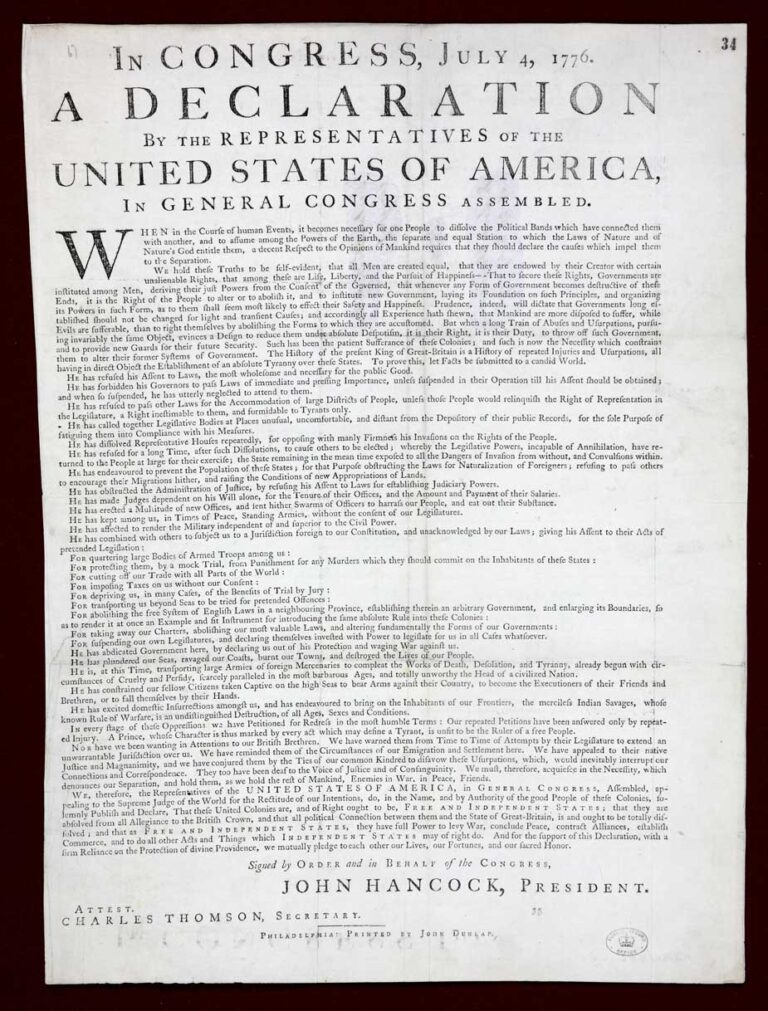This is the second part of a two-blog series exploring treason against the state, as used during the civil wars of the 1640s and again in the American Revolutionary War of the 1770s and 80s. Previously, treason laws had always protected the life and authority of the monarch. Now, they were used by those that levied war against the monarch to reject royal authority and accuse their kings of levying war – of committing treason – against the state.
In our first blog, the execution of Charles I was framed in the context of his crimes against the state for ‘levying war against the said Parliament and People’ (see footnote 1). In this final part, we’ll examine how and why America declared independence from Great Britain, and where treason fits into this story.
Treason doth never prosper; what’s the reason?
For if it prosper, none dare call it Treason.
John Harington (1561–1612)
Treason on both sides?
The execution of Charles I for treason against his people in January 1649 created the historic precedent that monarchs could be held accountable for their (alleged) crimes. In the 1770s, this theory that kings could commit – and be punished for – treasonable actions was tested once again.

This time, it was King George III accused of levying war against his subjects in the British colonies in North America. The people of these American colonies had become increasingly frustrated throughout the 1760s and 1770s by the British Parliament trying to levy taxes against them, despite these colonies not having any representation in Parliament. These frustrations resulted in many acts of protest, including the Boston Tea Party of December 1773, when an entire shipment of tea sent by the East India Company was dumped into Boston harbour, protesting the 1773 Tea Act.
The British authorities in America were unsure how to prosecute these protestors and asked the Attorney General in England for advice. He responded that these protests constituted high treason as they undermined the state of Great Britain by contravening a British act of Parliament. However, these authorities found it difficult to prosecute the offending parties, as there was little appetite in America to punish those protesting such controversial taxes.
In March 1774, Parliament ordered that the port of Boston be closed until such time as they paid for the tea destroyed the previous December. This only exacerbated tensions across the thirteen colonies in America, who supported their sister state of Massachusetts and imposed a boycott on British imports.
Refusing to back down, George III declared the state to be in open rebellion in February 1775, and authorised the use of force to restore British rule. Armed hostilities broke out in April at the battles of Lexington and Concord. Like Charles I before him, George III was now at war with his own subjects.
‘Rebellion’ or a traitorous king?

In August 1775, George III issued the Proclamation for Suppressing Rebellion and Sedition, declaring the American colonies to be in a state of ‘open and avowed rebellion’. Part of the proclamation urged loyal subjects in America to ‘disclose and make known all treasons and traitorous conspiracies’. A definite statement by the King of Great Britain that the American rebels had committed treason against their king.
But the American people didn’t see it that way. To them, it was King George that had levied war against his subjects in the American colonies. Their declaration of independence, signed on 4 July 1776, formally denounced the authority of the British monarch in the American colonies, in response to George III’s treasonous and tyrannical actions.
The US Declaration of Independence
Much of the US Declaration of Independence is a list of complaints about King George’s abuses. As with the sentencing of Charles I a century earlier, it was designed to demonstrate how the king was unfit to rule:
The history of the present King of Great Britain is a history of repeated injuries and usurpations, all having in direct object the establishment of an absolute Tyranny over these States. To prove this, let Facts be submitted to a candid world.
The US Declaration of Independence, 1776 (see footnote 2)
Specific abuses echoed the charges laid against Charles I in 1649. In the declaration, King George was denounced as having ‘plundered our seas, ravaged our Coasts, burnt our towns, and destroyed the lives of our people’; Charles I had been found ‘guilty of High Treason and of the murders, rapines, burnings, spoils, defilations, damages, and mischiefs to this nation’.
The American people thus used George III’s alleged abuses to declare themselves free from the ‘tyranny’ of Great Britain, free ‘to levy War, conclude Peace, contract Alliances, establish Commerce, and to do all other Acts and Things which Independent States may of right do’.

Treason against the United States
Like the Commons of the 1640s before them, the newly independent United States of America utilised the language of treason to condemn their king for his crimes against the state. Similarly, following their separation from King George III, treason laws now protected the republican state. The treason clause of the US Constitution, created in September 1787, is the only criminal law in the US founding document. As with the treason laws of the English Commonwealth in the 1650s, treason in the US Constitution drew on the 1352 Treason Act for inspiration, declaring that ‘Treason against the United States, shall consist only in levying War against them, or in adhering to their Enemies, giving them Aid and Comfort’ (see footnote 3).
However, unlike in England, kings were never invited back to rule America, meaning that their acts of treason – of levying war against their king – are instead remembered as positive acts of revolution and liberation, whereas the actions of George III are remembered as traitorous to the American people. Those that executed Charles I, on the other hand, have gone down in history as regicides. Just as history is written by the victors, so too is treason a matter of perspective.
On 3 March 2023, you can join specialists Philippa Hellawell of The National Archives and Corinne Porter of the USA’s National Archive & Record Administration (NARA) for a unique online event discussing devotion and duplicity during the American Revolutionary War.
Footnotes
- The sentencing of Charles I, SP 16/517, fo 44v
- The US Declaration of Independence, EXT 9/1
- US Constitution, Article III, Section 3, Clause 1
One would suppose the so-called United Stated of America (USA) as an erstwhile Crown Colony, to all intents and purposes, is still in a ‘treasonable state’ and will remain so since having declared ‘independence’ even despite any historic War of Independence that saw Great Britain militarily lose out.
By the way Dr. Jordan Peterson renowned, if controversial, Canadian psychologist, author and media commentator has stated in one of his, always listenable and watchable online talks, lectures or ‘tubular discourses’ has stated in so many words that ‘the USA’s Declaration of Independence was pretty much written by the English’. https://en.wikipedia.org/wiki/Jordan_Peterson
The Treaty of Paris (1783) settled the matter. The settlement terms were so bad for the British, they refused to sit for the official painting. The Americans are alone in the painting. One of the American negotiators, Henry Laurens, was still held in a British prison after negotiations had already started. By the way, since the “Declaration of Independence” was written before the War, the colonists were BRITISH citizens. Much of the foundation for our government was laid out by Greek and Scot writers and the errors of pervious European nations.
I have often wondered, why the American Revolution wasn’t called their first Civil War, with both Patriots and Loyalists fighting each other. At the Battle of Kings Mountain , 7th October 1780, Major Ferguson, was the only non colonialist present……
Thanks for your comments, Bobbie. To characterise the United States as a ‘treasonable state’ would be incorrect. The first article of the Treaty of Paris 1783 (still in force) states that:
‘His Brittanic Majesty acknowledges the said United States … to be free sovereign and Independent States; that he treats with them as such, and for himself his Heirs & Successors, relinquishes all claims to the Government, Propriety, and Territorial Rights of the same and every Part thereof’.
The Treaty legally recognises the Declaration’s claims of independence and relinquishes any claims the British Crown had over the United States or its citizens – therefore making them incapable of committing treason against George III or his successors. The US National Archives has a digital copy and transcript of the Treaty available on their website (https://www.archives.gov/milestone-documents/treaty-of-paris#:~:text=This%20treaty%2C%20signed%20on%20September,States%20as%20an%20independent%20nation.)
Treasonous? So what? The use of historical precedents? Immaterial. By 1775, Americans had developed their own understanding of who they were in relation to the King and England. Having thought of themselves as good “English citizens” from the start, this new “nationalist” consciousness arose from being repeatedly and bluntly treated as second class. They were furious at the notion that the King (managed by Parliament) and the Parliament itself rebuffed their requests to be treated like other Englishmen. How could they be denied the vote? Why was it acceptable for Englishmen of property to decide on their own taxes and not the Americans?
The most puzzling aspect of the dispute was that the British Government failed to realise the basic strength of the American colonies if they combined, as they were obviously very likely to do unless the British achieved a rapid victory which they failed to do.
Surely it is not over-using hindsight to think that the longer the conflict continued the more likely it would be that the French would become militarily involved. When they did it must have been obvious that the war was unwinnable and that the wisest course would be to make the best peace they could and retain a friendly if more distant relationship with an independent United Colonies of America. So why didn’t that happen ? – Noel Baptiste
The Revolutionary War was in fact a “Civil War”. Prior to the 1770’s, the residents of the British Colonies considered themselves to be “Englishmen”. In the beginning, they could not understand why they were being treated as second class citizens, with absolutely no representation in Parliament.
As Great Britain used more and more forceful tactics, to bring the colonists under “control”, the vast majority of the people of the colonies believed that the King and Parliament were punishing them, without any valid reasons. Even many of those who became “Loyalists” felt that the government of the United Kingdom was “way out of line”.
As a dual citizen of Canada and the United States of America, I have a somewhat unique viewpoint of the history of that conflict.